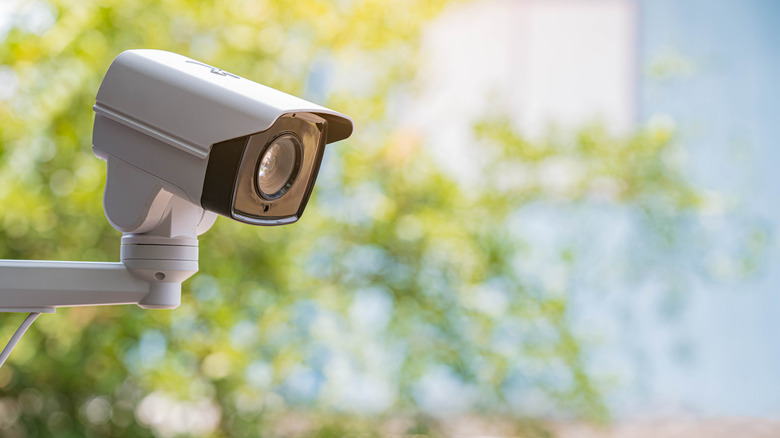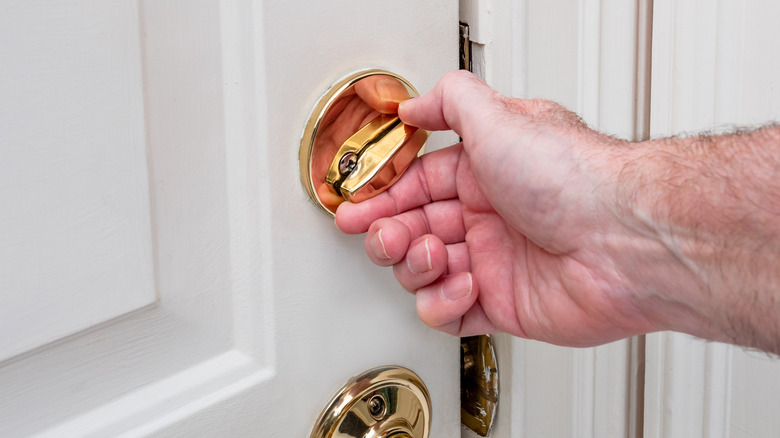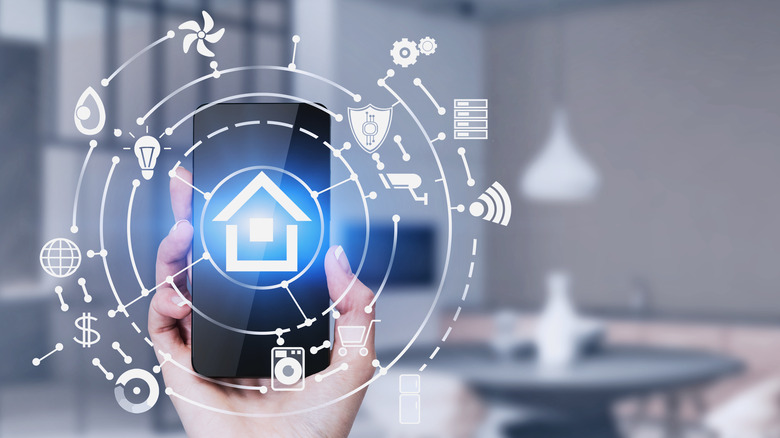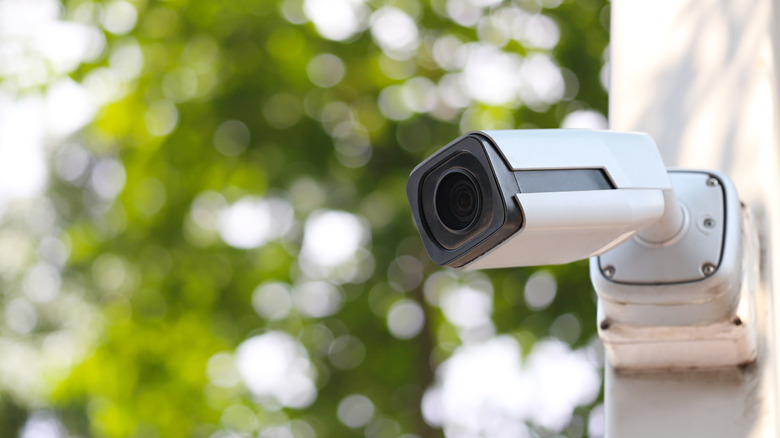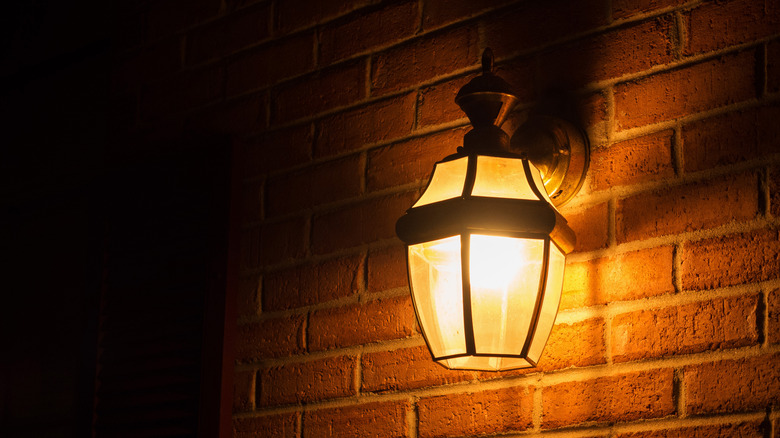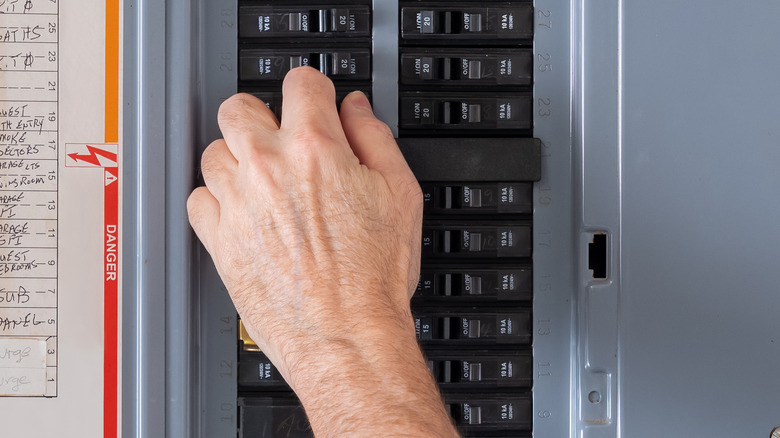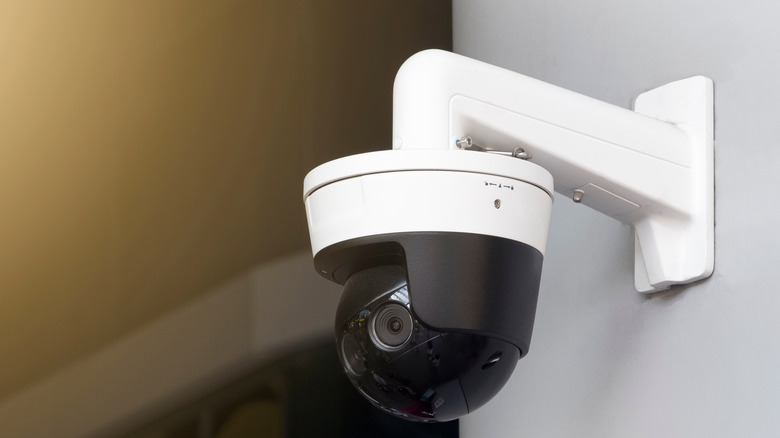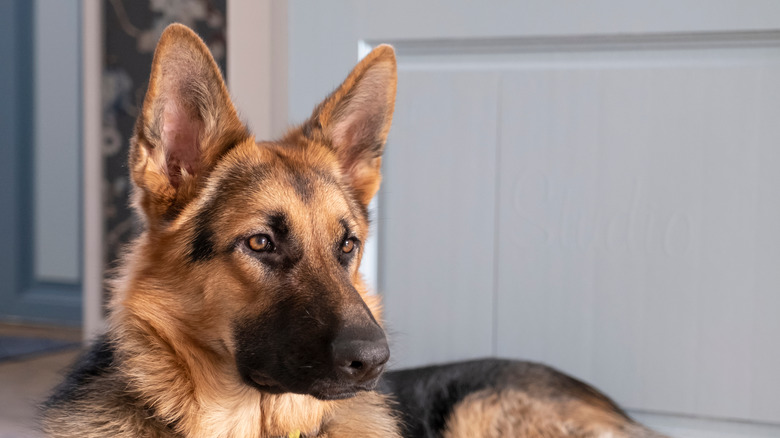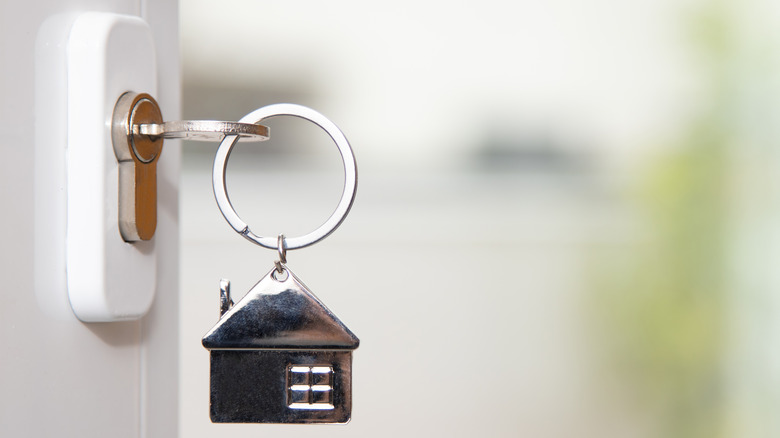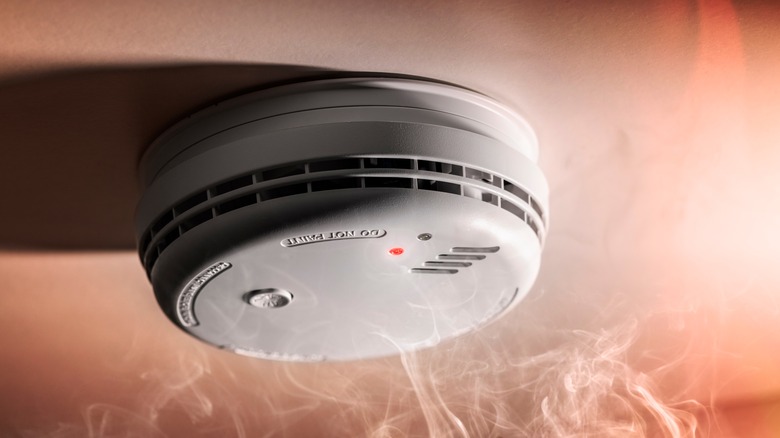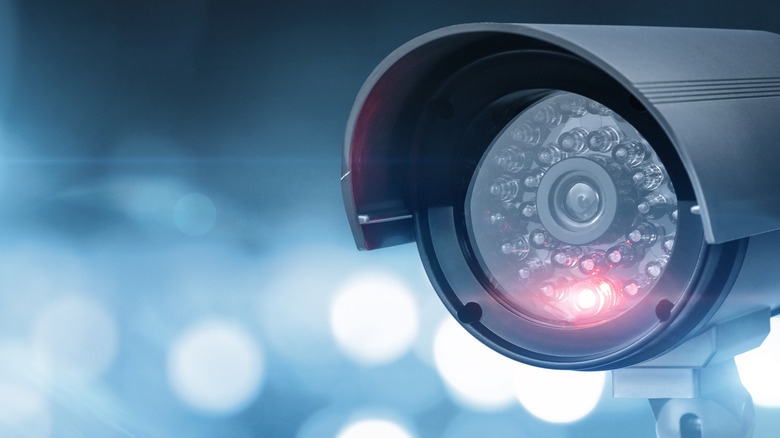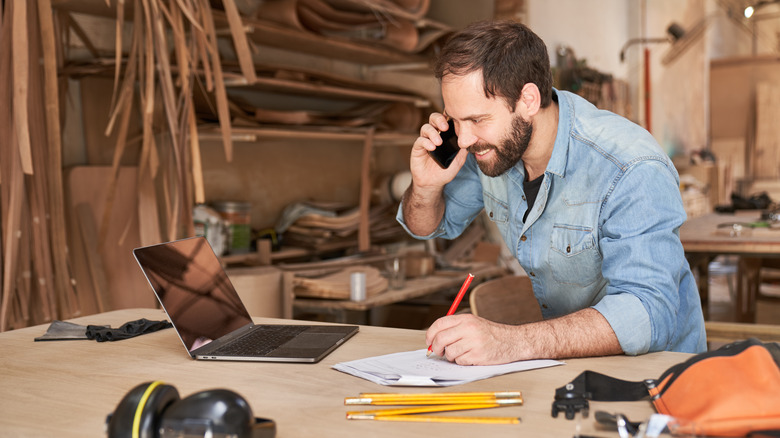Mistakes Everyone Makes When Buying A Home Security System
According to Safe at Last, 75 percent of homes in the United States will experience a break-in during the next 20 years. In addition, the average dollar loss per burglary was $2,661 in 2019 (via FBI). These are sobering statistics, so how do you prevent your home from becoming one of them? Purchasing a home security system, updating the locks on your house, and maybe even adopting a family guard dog are high on the list of ways to keep yourself and your property safe. However, if done incompletely or incorrectly, you will be highly vulnerable to theft and property damage.
When someone breaks into your house, it causes damage to your home and your emotional wellbeing. Symptoms of people who have experienced a recent robbery include poor sleep, loss of appetite, and increases in overall anxiety (via Psychology Today). You'll want to make the right choices when purchasing a home security system to protect your property and overall health. After you figure out the cost to install a security system, you'll want to avoid these top mistakes everyone makes during the buying process.
Forgetting to research different alarm companies
The market for home security systems is a saturated one. Since there are so many options, it can be challenging to make the right choice. If you can't decide between options, the Electronic Security Association is a third-party organization that functions as a test of quality assurance for particular alarm companies.
After contacting them, you can also research and read reviews of alarm companies that serve your area on the Better Business Bureau. Check out local review sites like Yelp, Angi, and Google. Finally, reach out to at least three alarm companies for quotes or specific information about your house. By selecting several, you'll have a better idea if the prices and services promised by one company are an outlier (via My Alarm Center). Depending on your home's location (urban or rural) and the type of home you have (apartment, condo, or single-family home), your security needs — and the price tag — will vary greatly.
Failing to upgrade door locks and reinforce entry points
Just because you have a security system doesn't mean you shouldn't take extra precautions. It's easy to think you are safe with the digital protection of a home security system, but that's just one part of the process. You still need to upgrade your doors' locks and reinforce all entry points to your home. According to Ultimate Lock, one of the easiest ways to make things safer is to install longer hinge screws. The extra length of the screws in this crucial juncture means that the door offers better protection against brute force attacks.
In addition to upgrading your hinge screws and ensuring your home has a deadbolt, you can also think about purchasing a letterbox cage if you have a mail slot on your front door. This way, a potential intruder can't simply push the box open for a clear view into your home. Or, even worse, use a pole or other item to fish something off of a nearby table. Finally, consider adding a peephole or digital doorbell to see who is really outside your door as an added layer of security.
Thinking that locks will do the trick and you don't need an alarm
Sometimes, we upgrade our entry points and think we don't need an alarm because it'll be challenging to break into our homes. This thinking is a big mistake and can leave your home vulnerable to intruders. According to Angi, locks and alarms are teammates that serve different purposes. We should be thinking of locks as a proactive measure. A locked door is usually enough of a deterrent for most criminals. Even when it's not, they will have to work harder and spend more time trying to break into your home. This effort means that it's more likely they will get caught in the act.
An alarm, however, is more of a reactive measure. You can think of it sort of as a last line of defense. When an intruder succeeds in getting your door open or breaks your window, your alarm will blare. Typically, someone calls the police. The loud noises generated and the potential of law enforcement to show up on the scene will scare off most other criminals before they can do any more damage.
Purchasing just any old CCTV camera
When buying a security camera for your home, it's essential to find a camera that can get the job done. Sometimes, people have cameras installed that don't even work, assuming their presence alone will be enough to deter thieves. However, cameras work as a reactive form of security — they provide evidence after the fact — so they are useless if they don't work.
According to Canadian Security Professionals, too many people see price as the number one factor when purchasing a CCTV camera for the home. Unfortunately, if you have a camera and the quality is so poor that you can hardly make out what you're looking at, it's not worth the investment. The same is true for cameras with low storage capacities. If you only keep recordings for 24 hours, or your camera can only record for up to 15 seconds, it's not much help when you are trying to see who is lurking around your front porch.
Choosing static lighting instead of motion sensor lighting
When choosing lighting for your outdoor areas, it's essential to distinguish between static lighting and motion-activated lighting. You don't want to give thieves perfect lighting to see as they go about their business. Motion-activated lighting will likely scare them off. As Samantha Nolan, a Neighborhood Watch trainer for the Metropolitan Police Department of Washington D.C., told NPR, "People who leave their lights on during the day and they're on 24 hours a day actually attract attention from burglars. Because if you're home, you're going to turn the lights off and it signals there's somebody home."
While we might think it makes more sense to leave some lights on to scare off burglars, it might give them pause. If the lights haven't changed in over a day, it's clear that no one is home. This practice is the same as leaving your porch light on in anticipation of coming home late at night. It's like ringing the dinner bell. Instead, having your lights on timers, sensitive to movement, or able to be controlled remotely is a much safer option.
Purchasing a home security system, then leaving your valuables in plain sight
Even if you have a strong lock on your door, a state-of-the-art camera system, and the world's loudest alarm, there is still a big mistake you are probably making for your home's security. While these steps are important to be truly secure, you still need to take extra precautions inside your home, like shielding your valuables from view.
While everyone has heard that you shouldn't post the exact dates of your vacations on social media (signaling to the world that your home is unattended), you might not have thought of taking similar precautions when you are actually home. Avoid posting photos of your valuables online, even if it's not priceless art and just a large television. To some people, that's more than enough reason to drop in unannounced. According to Family Handyman, it's also a good idea to tuck some of our most valuable items like emergency cash or hard drives in places like air vents, false drawers, or even in with our winter clothes, just in case.
Installing the alarm panel box in plain sight
According to Alarm Grid, your alarm panel box placement is key to your home's security. If the intruder can see the box, your home is in danger. However, an alarm panel box that has been tampered with has the potential to ruin your entire home security system. You can keep it safe by ensuring that it's not somewhere easy to find. Typically, people choose to set up the box in their basement, attic, or storage closet. You will need to run wires into and out of the box, so whatever location you choose still needs to be near enough to a PowerPoint.
On the other hand, your keypad should be near your door because you only have a few moments to turn off the alarm when you enter, so you don't want to hunt it down. Even if thieves think they are disarming your entire system by destroying your keypad, that's not true because the alarm panel box is the system's heartbeat.
Forgetting to consider night vision when purchasing cameras
You need to be able to see intruders at all hours of the day, especially in low light conditions. When you purchase a security system, it won't be very helpful if it doesn't have night vision functionality. According to Network Camera Tech, if your camera has poor night vision, you should install a motion-activated light nearby. If anything happens, the light will illuminate the scene for the camera to properly record.
Remember that you do need to pay special attention to the placement of the light. Placing the light too close to the camera (or directly across from it) can create a blinding effect that damages all potential footage. However, the best way to avoid these problems is simply to purchase a camera with high functioning night vision at the beginning, instead of trying to doctor up one that doesn't have it.
Adopting a dog instead of purchasing a security system
Having a dog in your home can help deter intruders, but it won't keep them away entirely. To get the best protection, purchase a system that complements your canine. However, don't rely on Fido as a security system. According to SafeWise, it's harmful to place all your home's protection on your pet's shoulders. The reasoning is that first, your pet can't alert the police if something is happening in your home, like an alarm. Second, an intruder could harm your pet, especially if they are armed. Even protection breeds like German Shepherd, Doberman Pinscher, or even a Cane Corso are no match for a firearm.
The best way forward is to get a home security system that actively keeps your pet safe, too, instead of relying on it to protect the house. Several companies cater to dog owners, offering in-home cameras to check on your pet while you're away and look out for other threats to their health, like gas leaks (via This Old House).
Leaving a key hidden in plain sight
Leaving a key out somewhere in your yard is a common practice. Families might find it helpful to keep one out for their school-aged children or friends watching their homes. However, since it's so common, most home intruders know where to look. If you're hiding a key, you need to avoid these common spots. According to ADT, the most common places someone with poor intentions will look for a key are the mailbox, under the welcome mat, in a plant pot near the door, or a fake rock.
When deciding where to leave your key, you'll need to think like a thief. Try hiding it in a secret place farther away from the door. For example, you can hide it in the grill in the backyard, a birdhouse on the other side of the lawn, or a plant pot far away from the door. The key to hiding a key is distance. Make it less convenient, and most people looking for it won't know where to start.
Forgetting other security elements, like carbon monoxide poisoning
One of the biggest mistakes people make when buying a home security system is forgetting that there are other threats to your home than just humans. The biggest of these threats is the silent killer, carbon monoxide. According to SafeWise, carbon monoxide is a clear, tasteless, odorless gas. Unfortunately, its victims don't even know what's happening. They might feel weak and a bit dizzy, then overwhelmingly sleepy. Once they fall asleep, the mortality rate is high as they will continue to breathe it in. Every year, 400 Americans die from accidental carbon monoxide poisoning, and 20,000 go to the emergency room due to complications from inhalation (via CDC).
Carbon monoxide detectors are lifesavers because they can alert you to dangerous gas levels in your home before they get too high. Once alerted, you can remove yourself from the premises and take steps to stop the leak and let the gas dissipate from your home.
Only purchasing one camera for the entire house
Most homes have at least two main entry points, if not more. When purchasing cameras as a part of your home security system, it's worth considering which entry points you would like to cover. According to Vivint, most people think they want a camera on their front porch, but a wider angle might be more helpful. This angle covers the driveway, garage door, and walkway with just one camera.
If you have a shed with valuables in your backyard or live somewhere with an accessible rear entry, perhaps on a larger plot of land where simply someone could walk around the house, consider installing a second camera to keep your home secure. In addition to outdoor cameras, more and more homeowners are also installing monitors inside their homes to keep an eye on pets, family members, and valuables while they are away.
Forgetting that your security system can be hacked
The thing meant to keep you safe can be a source of danger, so you need to be aware. According to NordVPN, Amazon's home security system Ring has experienced an uptick in virtual home invasions. The instances are terrifying, featuring strange men speaking to young children (via YouTube). There are additional reports of intruders simply monitoring people to keep track of their comings and goings or gathering sensitive information shared within earshot of the device.
While Amazon insists that they fixed the security issues leading to these hacks, some users aren't sure. Due to the potential for a breach, it's always important to note that the things we bring into our homes for our safety might cause us more harm in the long run. We must take extra steps like using strong WiFi passwords, enabling two-factor authentication on our devices, and keeping security software up to date.
Shelling out too much money on fancy systems
Depending on your experience level, a DIY security system can work just fine to provide your family with the level of care you need. According to This Old House, you might not need to pay a company to come out and install an expensive alarm system in your home. If you are good with technology and know the level of protection you would like for your home, it's possible to step up everything yourself instead.
You can buy items like doorbell cameras, motion sensors for entry points, and even sirens and smoke detectors separately or in handy kits. You just need to spend an afternoon setting things up around your house to complete the project. Once installed, you can easily monitor these DIY systems with a smartphone app. Some people think that home security needs to be complicated, which is a common mistake. Even small home security measures are better than none at all.
